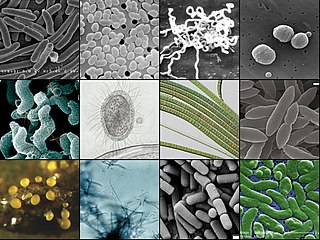Related Research Articles

Biochemists are scientists who are trained in biochemistry. They study chemical processes and chemical transformations in living organisms. Biochemists study DNA, proteins and cell parts. The word "biochemist" is a portmanteau of "biological chemist."
The National Institute of Arthritis and Musculoskeletal and Skin Diseases (NIAMS) is one of the institutes and centers that make up the National Institutes of Health, an agency of the United States Department of Health and Human Services (HHS).
The University of Texas Southwestern Medical Center is a public academic health science center in Dallas, Texas. With approximately 23,000 employees, more than 3,000 full-time faculty, and nearly 4 million outpatient visits per year, UT Southwestern is the largest medical school in the University of Texas System and the State of Texas.

A biologist is a scientist who conducts research in biology. Biologists are interested in studying life on Earth, whether it is an individual cell, a multicellular organism, or a community of interacting populations. They usually specialize in a particular branch of biology and have a specific research focus.

A Medical Laboratory Scientist (MLS) or Clinical Laboratory Scientist (CLS) or Medical Technologist (MT) performs diagnostic testing of blood and body fluids in clinical laboratories. The scope of a medical laboratory scientist's work begins with the receipt of patient or client specimens and terminates with the delivery of test results to physicians and other healthcare providers. The utility of clinical diagnostic testing relies squarely on the validity of test methodology. To this end, much of the work done by medical laboratory scientists involves ensuring specimen quality, interpreting test results, data-logging, testing control products, performing calibration, maintenance, validation, and troubleshooting of instrumentation as well as performing statistical analyses to verify the accuracy and repeatability of testing. Medical laboratory scientists may also assist healthcare providers with test selection and specimen collection and are responsible for prompt verbal delivery of critical lab results. Medical Laboratory Scientists in healthcare settings also play an important role in clinical diagnosis. An estimated 70% of medical decisions are based on laboratory test results and MLS contributions affect 95% of a health system's costs.
The Graduate School of Biomedical Sciences is one of the eight schools that comprise Tufts University. The Graduate School of Biomedical Sciences (GSBS) is located on the university's health sciences campus in the Chinatown district of Boston, Massachusetts. The school was previously named the Sackler School of Graduate Biomedical Sciences but on December 5, 2019, the university announced it was removing the Sackler name from the school, because of the Sacklers' role in the opioid epidemic through their ownership of Purdue Pharma.
North Carolina State University College of Veterinary Medicine is an American educational institution located in Raleigh, North Carolina that offers master's and doctorate-level degree programs; interdisciplinary research in a range of veterinary and comparative medicine topics through centers, institutes, programs and laboratories; and external engagement through public service programs and activities.

The College of Sciences at the University of Texas at San Antonio in San Antonio, Texas is a science and research education college. The college hosts more than 6000 students enrolled in fifteen undergraduate programs and nineteen graduate programs. The eight departments employ over 300 tenure and non-tenure track faculty members. Students collaborate through programs with local external research institutions including UT Health Science Center, Southwest Research Institute and the Southwest Foundation for Biomedical Research.
The School of Biological Sciences is a School within the Faculty Biology, Medicine and Health at The University of Manchester. Biology at University of Manchester and its precursor institutions has gone through a number of reorganizations, the latest of which was the change from a Faculty of Life Sciences to the current School.

The College of Natural Science (NatSci) at Michigan State University is home to 27 departments and programs in the biological, physical and mathematical sciences.

Harbin Medical University (HMU) (Chinese: 哈尔滨医科大学) is a public university located in Harbin, Heilongjiang, China.
Several universities have designed interdisciplinary courses with a focus on human biology at the undergraduate level. There is a wide variation in emphasis ranging from business, social studies, public policy, healthcare and pharmaceutical research.
The Vilcek Institute of Graduate Biomedical Sciences at the NYU School of Medicine is a division of the New York University Graduate School of Arts and Science, leading to the Ph.D. degree and, in coordination with the Medical Scientist Training Program, combined M.D./Ph.D. degrees. The institute sets the policies for its admissions, curriculum, stipend levels, student evaluations and Ph.D. requirements.
The School of Biological Sciences is a research-led academic community at the University of East Anglia. It works with partners in industry on a range of activities, including translating research discoveries into products, making knowledge and research expertise available through consultancies, contract research and provision of analytical services, as well as partnering industry in training both undergraduate and postgraduate students.

Biomedical sciences are a set of sciences applying portions of natural science or formal science, or both, to develop knowledge, interventions, or technology that are of use in healthcare or public health. Such disciplines as medical microbiology, clinical virology, clinical epidemiology, genetic epidemiology, and biomedical engineering are medical sciences. In explaining physiological mechanisms operating in pathological processes, however, pathophysiology can be regarded as basic science.

A bacteriologist is a microbiologist, or similarly trained professional, in bacteriology— a subdivision of microbiology that studies bacteria, typically pathogenic ones. Bacteriologists are interested in studying and learning about bacteria, as well as using their skills in clinical settings. This includes investigating properties of bacteria such as morphology, ecology, genetics and biochemistry, phylogenetics, genomics and many other areas related to bacteria like disease diagnostic testing. Alongside human and animal healthcare providers, they may carry out various functions as medical scientists, veterinary scientists, pathologists, or diagnostic technicians in locations like clinics, blood banks, hospitals, laboratories and animal hospitals. Bacteriologists working in public health or biomedical research help develop vaccines for public use as well as public health guidelines for restaurants and businesses.
Institute for Medical Research, Israel-Canada (IMRIC) is a research institute affiliated with the Faculty of Medicine of the Hebrew University of Jerusalem.
References
- ↑ "The Scientific Workforce Policy Debate: Do We Produce too Many Biomedical Trainees?" (PDF). Archived from the original (PDF) on 6 December 2011. Retrieved 19 November 2011.
- ↑ "Subject Benchmark Statement" (PDF). www.qaa.ac.uk. 2015. Archived from the original (PDF) on 2018-12-25. Retrieved 2019-08-13.
- ↑ Paul D. Ellner (2006). The Biomedical Scientist as Expert Witness. ASM Press. ISBN 1-55581-345-3.
- ↑ "HCPC - Health and Care Professions Council - Protected titles". www.hcpc-uk.org.
- ↑ "NHS Practitioner Training Programme". www.nshcs.hee.nhs.uk.
- ↑ "Biomedical scientist job profile - Prospects.ac.uk". www.prospects.ac.uk.
- ↑ "Home". Institute of Biomedical Science.
- ↑ "Admission FAQS for The Basic and Biomedical Sciences Division of the Graduate School of Biomedical Sciences at UMass Medical School, Worcester". Archived from the original on 2 June 2012. Retrieved 8 November 2011.
- ↑ "Education & Development » Biomedical science courses - the Institute of Biomedical Science". Archived from the original on 2011-04-23. Retrieved 2011-03-08.
- ↑ "Heads of University Centres of Biomedical Sciences (HUCBMS)". www.hucbms.org.
- ↑ "HUCBMS 1993-2018 25 Years of Success". ResearchGate.
- ↑ "Health Careers". Archived from the original on 2007-09-29. Retrieved 2007-03-11.
- ↑ See also: Systems biology
- ↑ "Agenda for change - pay rates". April 2020.
- 1 2 "Medical Scientists - US Bureau of Labor Statistics".
- ↑ "Science » Careers – The Institute of Biomedical Science". Archived from the original on 14 February 2013.